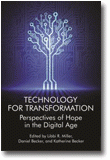
Technology For Transformation
Perspectives of Hope in the Digital Age
Edited by:
Libbi R. Miller, California State University, Fresno
Daniel Becker, Lakehead University
Katherine Becker, Lakehead University, Orillia
Published 2016
This book serves as a platform for educators and researchers to unite educational technology and social justice. While educational technology is a rapidly changing and progressive field of research and practice, it remains largely separate from education for social justice. Current literature about educational technology is often approached from a technical, how-to perspective that emphasizes ways to implement technology into the classroom. Technology is often viewed as inevitable, yet neutral and value-free. Educational technology, however, is anything but neutral. The contributors collectively advance a hopeful discourse by exploring the potential of technology as a vehicle to transform and emancipate, while not forgoing a critically reflective measure of self-conscious critique of our own role as educators, students, or scholars in oppressive silences, constraints and conditions. This edited collection makes an important and unique contribution to the field, as it will be the first published volume to detail research, theory, and practice regarding student use of technology in achieving liberatory aims since IAP’s 2009 publication, ICT for Education, Development and Social Justice.
The fields of educational technology and social justice are vast and applicable in many domains, including teacher education, graduate programs, and K-12 education. This work is intended to appeal to a diverse academic and professional audience of K-12 teachers, teacher educators, educational technology and social justice scholars, and policy makers. Scholars and academics instructing graduate-level educational technology courses can reference this edited collection as the most current text on socially just educational technology. Educational practitioners from teacher education programs and the K-12 sector may use this book as a source of ideas and inspiration to incorporate student use of technology toward emancipatory aims. This title could be adopted as a course text for both undergraduate and graduate education courses in: media literacy, digital literacy, distance education, education for social justice, and teacher preparation, and educational technology courses. Readers will also be able to use the book as a guide when critically analyzing their own professional practice, whether it is in research, working with K-12 students, or preparing future educators or scholars.
CONTENTS
Foreword, Brad Porfilio. Introduction, Libbi R. Miller, Daniel Becker, & Katherine Becker. SECTION I: QUESTIONING TECHNOLOGY. Approaching the Ground of Our Assumptions About Educational Technologies, Matthew Kruger-Ross. Claiming Technology for Democracy and Social Justice: An Approach to Educational Technology, Libbi R. Miller. Creating Citizens Capable of Advancing Democratic Deliberation in a Networked World, Daniel H. Becker. SECTION II: STRIVING FOR SOCIAL JUSTICE THROUGH TECHNOLOGY. Indigenous Peoples and the Role of Technology in Language Preservation: Navajo Nation, Rosemary Papa and Jon Reyhner. Open Access in Education Publishing: A Movement Toward More Socially Just Knowledge Dissemination and Exchange, Katherine Becker and Sonia Mastrangelo. Network Learning Literacy: PLE & ONLE For Digital Lifelong Learning, Chih-Hsiung Tu, Cherng-Jyh Yen & Laura Sujo-Montes. SECTION III: EDUCATING FOR SOCIAL JUSTICE IN TEACHER EDUCATION. Questioning Technology Integration in Teacher Preparation, Shadow W. J. Armfield. Transformative Learning: Musings on Space, Place, Pedagogy and the Role of Educational Technology, Susan Crichton and Deb Carter. Technology in Teacher Education: A Study of Pre-Service Teacher Perspectives, Liz Breton. SECTION IV: EDUCATIONAL TECHNOLOGY AND SOCIAL JUSTICE IN THE K-12 CLASSROOM. Disrupting a Diversity Desert: A Rural Teacher’s Journey, Jennice McCafferty-Wright. Social Divides, Digital Bridges: Exploring the Potential of Technology in Inclusive Education, Stacy Gherardi. Pathways for All: Teens, Tech, and Learning, Cassandra Scharber, Cynthia Lewis, Tracey Pyscher, and Kris Isaacson. Global Digital Citizenship, J. Michael Blocher. Facilitating Social Justice Inquiry Through Project-Based Learning and Technology, Rebecca Fraser. About the Editors. About the Contributors.
-
Paperback9781681234373
Web price: $45.04 (Reg. 52.99)
-
Hardcover9781681234380
Web price: $80.74 (Reg. 94.99)
- eBook9781681234397

- EDU000000 - EDUCATION: General
- EDU039000 - EDUCATION: Computers & Technology
- EDU037000 - EDUCATION: Research
-
 (Re)Envisioning Social Studies Education Research
Current Epistemological and Methodological Expansions, Deconstructions, and Creations
(Re)Envisioning Social Studies Education Research
Current Epistemological and Methodological Expansions, Deconstructions, and Creations
-
 Distance Learning
Volume 20 #3
Distance Learning
Volume 20 #3
-
 Distance Learning
Volume 20 #4
Distance Learning
Volume 20 #4
-
 Innovations in Computational Intelligence, Big Data Analytics and Internet of Things
Innovations in Computational Intelligence, Big Data Analytics and Internet of Things
-
 Machine Learning, Natural Language Processing, and Psychometrics
Machine Learning, Natural Language Processing, and Psychometrics
-
 Qualitative Research With Diverse and Underserved Communities
Qualitative Research With Diverse and Underserved Communities
-
 Rekindling Embers of the Soul
An Examination of Spirituality Issues Relating to Teacher Education
Rekindling Embers of the Soul
An Examination of Spirituality Issues Relating to Teacher Education

